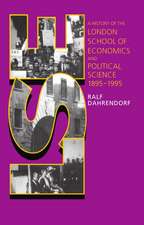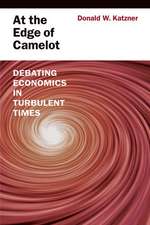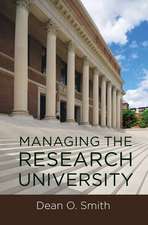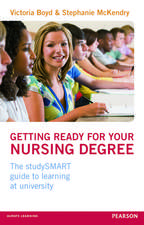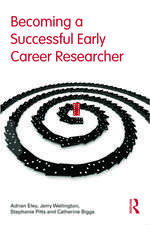The Sustainable University: Progress and prospects: Routledge Studies in Sustainable Development
Editat de Stephen Sterling, Larch Maxey, Heather Lunaen Limba Engleză Paperback – 30 mai 2014
Written by leading exponents of sustainability and sustainability education, this book brings together examples, insight, reflection and strategies from the experience of ten universities, widely recognised as leaders in developing sustainability in higher education. The book thus draws on a wealth of experience to provide reflective critical analysis of barriers, achievements, strategies and potential. It critically reviews the theory and practice involved in developing the sustainable university in a systemic and whole institutional manner, including the role of organisational learning.
While remaining mindful of the challenges of the current climate, The Sustainable University maps out new directions and lines of research as well as offering practical advice for researchers, students and professionals in the fields of management, leadership, organisational change, strategy and curriculum development who wish to take this work further.
| Toate formatele și edițiile | Preț | Express |
|---|---|---|
| Paperback (1) | 487.37 lei 6-8 săpt. | |
| Taylor & Francis – 30 mai 2014 | 487.37 lei 6-8 săpt. | |
| Hardback (1) | 1062.62 lei 6-8 săpt. | |
| Taylor & Francis – 8 feb 2013 | 1062.62 lei 6-8 săpt. |
Din seria Routledge Studies in Sustainable Development
-
 Preț: 311.29 lei
Preț: 311.29 lei -
 Preț: 322.34 lei
Preț: 322.34 lei -
 Preț: 304.74 lei
Preț: 304.74 lei -
 Preț: 304.66 lei
Preț: 304.66 lei -
 Preț: 416.22 lei
Preț: 416.22 lei - 14%
 Preț: 300.46 lei
Preț: 300.46 lei -
 Preț: 371.68 lei
Preț: 371.68 lei -
 Preț: 333.14 lei
Preț: 333.14 lei - 16%
 Preț: 244.38 lei
Preț: 244.38 lei -
 Preț: 446.32 lei
Preț: 446.32 lei -
 Preț: 413.55 lei
Preț: 413.55 lei -
 Preț: 490.46 lei
Preț: 490.46 lei - 16%
 Preț: 273.65 lei
Preț: 273.65 lei -
 Preț: 487.37 lei
Preț: 487.37 lei -
 Preț: 369.77 lei
Preț: 369.77 lei -
 Preț: 392.24 lei
Preț: 392.24 lei - 12%
 Preț: 299.52 lei
Preț: 299.52 lei - 18%
 Preț: 997.93 lei
Preț: 997.93 lei - 18%
 Preț: 997.90 lei
Preț: 997.90 lei -
 Preț: 411.42 lei
Preț: 411.42 lei -
 Preț: 449.41 lei
Preț: 449.41 lei -
 Preț: 449.41 lei
Preț: 449.41 lei -
 Preț: 389.66 lei
Preț: 389.66 lei -
 Preț: 416.22 lei
Preț: 416.22 lei -
 Preț: 416.22 lei
Preț: 416.22 lei -
 Preț: 389.49 lei
Preț: 389.49 lei -
 Preț: 326.03 lei
Preț: 326.03 lei - 17%
 Preț: 270.41 lei
Preț: 270.41 lei - 18%
 Preț: 1055.51 lei
Preț: 1055.51 lei - 18%
 Preț: 1000.27 lei
Preț: 1000.27 lei -
 Preț: 479.96 lei
Preț: 479.96 lei
Preț: 487.37 lei
Nou
Puncte Express: 731
Preț estimativ în valută:
93.26€ • 97.63$ • 77.16£
93.26€ • 97.63$ • 77.16£
Carte tipărită la comandă
Livrare economică 05-19 aprilie
Preluare comenzi: 021 569.72.76
Specificații
ISBN-13: 9781138801516
ISBN-10: 1138801518
Pagini: 360
Ilustrații: 26
Dimensiuni: 156 x 234 x 18 mm
Greutate: 0.41 kg
Ediția:1
Editura: Taylor & Francis
Colecția Routledge
Seria Routledge Studies in Sustainable Development
Locul publicării:Oxford, United Kingdom
ISBN-10: 1138801518
Pagini: 360
Ilustrații: 26
Dimensiuni: 156 x 234 x 18 mm
Greutate: 0.41 kg
Ediția:1
Editura: Taylor & Francis
Colecția Routledge
Seria Routledge Studies in Sustainable Development
Locul publicării:Oxford, United Kingdom
Public țintă
PostgraduateCuprins
Introduction Part 1: Context 1. The Sustainable University 2. ESD: Contesting the Market Model of Higher Education? 3. Higher Education and Sustainable Development – an International Perspective Part 2: Aspects 4. Promoting Sustainable Communities, Locally and Globally 5. Leadership 6. The Sustainable Community of a Sustainable University? 7. Curriculum and Pedagogies for ESD 8. Research at the Sustainable University: Fostering New Understandings 9. The Student Experience: Campus, Communities and Transition 10. Wellbeing Part 3: Institutional Change 11. Whole Institutional Change 12. Bottom(s) Up for Sustainability: The Kingston Experience 13. On the Journey - the Green Academy and HEA 14. The Sustainable University - Prospects
Recenzii
‘This is a must-read for every Vice-Chancellor, President and University Trustee of the world's 17,000 Higher Education Institutions (HEIs). While less than two percent of the world's population will graduate from an HEI, these graduates will form the vast majority of the future decision makers in the private and public sectors and civil society at large. As such, our HEIs are crucial entry points in the global attempt to create a more sustainable future. Our current global HEI leaders and their respective professional organizations have a major new responsibility-addressing sustainability. Here is their handbook to "the University of the Future".’ – Charles Hopkins, UNESCO Chair in Education for Sustainable Development, York University, Canada
‘If we choose to survive, and come to live in tune with the biosphere’s processes and limits, then universities will have made an indispensible contribution. But, to do this, they will first need to change and evolve. This is a welcome book about such processes, and one that all involved in higher education should read.’ – William Scott, Professor Emeritus, University of Bath, UK
‘This book is of great importance as it clearly illustrates which path universities still need to follow towards sustainability. However, the book also indicates how much progress has already been made by some universities, and this is encouraging!’ – Gerd Michelsen, UNESCO Chair in Higher Education for Sustainable Development, Leuphana University of Lüneburg, Germany
‘Universities have two responsibilities in relation to sustainability. The first is to educate their students, whatever their disciplines, so that they can be informed future citizens and promote sustainability in their personal and professional roles. The second is to deliver on their role as beacons of social responsibility and lead through example in their pursuit of sustainability as organisations. This book contributes substantially to the understanding of university leaders and policy makers in ensuring their organisations fulfil both these roles.’ – Nick Foskett, Professor and Vice Chancellor of Keele University, UK
‘The Sustainable University is an important contribution to the ongoing conversation about how higher education in all its aspects can transform to help create a sustainable future.’ – Geoff Chase, Dean, Undergraduate Studies and Director of the Center for Regional Sustainability, San Diego State University, USA
‘The contributors to this book are the people I believe in. They are the honest, courageous, humble, smart and tenacious agents of change toiling at the front lines in humankind’s epic struggle to save itself. The quality of mind and heart woven into these pages is beautiful in its authenticity and ambition. The effect is a chorus of shared vision, shared struggle and shared insight worthy of any reader’s time.’ – Leith Sharp, Founding Director of Harvard University’s Office for Sustainability and Founding Chair of the Sustainable Futures Academy, USA
‘This volume contains a wealth of experiences and ideas that will help higher-education institutions make a necessary and greater contribution to creating a more sustainable society. Universities should not only act as agents of change, but need to change themselves if they are to be sufficiently effective in this regard. This book shows us how.’ – Pamela S. Chasek, Professor, Government Department, and Director, International Studies Program, Manhattan College, USA
‘Like few other social institutions, universities have the freedom and the power to choose to be models of sustainable practices and relationships, and to make it part of their core business. The Sustainable University provides the rationale, strategies and exemplars for acting upon a positive choice.’ – John Fien, Professor of Sustainability, RMIT University, Melbourne, Australia
"…this is a remarkable addition to the literature on the still-emerging, constantly-transforming and otherwise difficult-to-define sustainable university. The citation of real-world experience and the networking of efforts in the UK context are insightful." – Robert J. Koester, Journal of Education for Sustainable Development
"The overall purpose of the book is to outline progress towards a sustainable university, review key aspects of what it means to develop such an institution, reflect critically on barriers, achievements, strategies and potential, and finally to consider prospects and map out possible new directions." – David Lorimer, Network Review
‘If we choose to survive, and come to live in tune with the biosphere’s processes and limits, then universities will have made an indispensible contribution. But, to do this, they will first need to change and evolve. This is a welcome book about such processes, and one that all involved in higher education should read.’ – William Scott, Professor Emeritus, University of Bath, UK
‘This book is of great importance as it clearly illustrates which path universities still need to follow towards sustainability. However, the book also indicates how much progress has already been made by some universities, and this is encouraging!’ – Gerd Michelsen, UNESCO Chair in Higher Education for Sustainable Development, Leuphana University of Lüneburg, Germany
‘Universities have two responsibilities in relation to sustainability. The first is to educate their students, whatever their disciplines, so that they can be informed future citizens and promote sustainability in their personal and professional roles. The second is to deliver on their role as beacons of social responsibility and lead through example in their pursuit of sustainability as organisations. This book contributes substantially to the understanding of university leaders and policy makers in ensuring their organisations fulfil both these roles.’ – Nick Foskett, Professor and Vice Chancellor of Keele University, UK
‘The Sustainable University is an important contribution to the ongoing conversation about how higher education in all its aspects can transform to help create a sustainable future.’ – Geoff Chase, Dean, Undergraduate Studies and Director of the Center for Regional Sustainability, San Diego State University, USA
‘The contributors to this book are the people I believe in. They are the honest, courageous, humble, smart and tenacious agents of change toiling at the front lines in humankind’s epic struggle to save itself. The quality of mind and heart woven into these pages is beautiful in its authenticity and ambition. The effect is a chorus of shared vision, shared struggle and shared insight worthy of any reader’s time.’ – Leith Sharp, Founding Director of Harvard University’s Office for Sustainability and Founding Chair of the Sustainable Futures Academy, USA
‘This volume contains a wealth of experiences and ideas that will help higher-education institutions make a necessary and greater contribution to creating a more sustainable society. Universities should not only act as agents of change, but need to change themselves if they are to be sufficiently effective in this regard. This book shows us how.’ – Pamela S. Chasek, Professor, Government Department, and Director, International Studies Program, Manhattan College, USA
‘Like few other social institutions, universities have the freedom and the power to choose to be models of sustainable practices and relationships, and to make it part of their core business. The Sustainable University provides the rationale, strategies and exemplars for acting upon a positive choice.’ – John Fien, Professor of Sustainability, RMIT University, Melbourne, Australia
"…this is a remarkable addition to the literature on the still-emerging, constantly-transforming and otherwise difficult-to-define sustainable university. The citation of real-world experience and the networking of efforts in the UK context are insightful." – Robert J. Koester, Journal of Education for Sustainable Development
"The overall purpose of the book is to outline progress towards a sustainable university, review key aspects of what it means to develop such an institution, reflect critically on barriers, achievements, strategies and potential, and finally to consider prospects and map out possible new directions." – David Lorimer, Network Review
Descriere
The direction of higher education is at a crossroads against a background of mounting sustainability related issues and uncertainties. This book seeks to inspire positive change in higher education through exploration of the rich notion of the sustainable university. Drawing on a wealth of experience, it provides reflective critical analysis on the potential of the sustainable university concept and offers advice for its implementation to researchers, professionals, students and policy makers.

